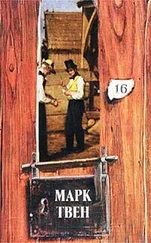Марк Твен - Roughing It
Здесь есть возможность читать онлайн «Марк Твен - Roughing It» — ознакомительный отрывок электронной книги совершенно бесплатно, а после прочтения отрывка купить полную версию. В некоторых случаях можно слушать аудио, скачать через торрент в формате fb2 и присутствует краткое содержание. Жанр: foreign_antique, foreign_prose, Путешествия и география, на английском языке. Описание произведения, (предисловие) а так же отзывы посетителей доступны на портале библиотеки ЛибКат.
- Название:Roughing It
- Автор:
- Жанр:
- Год:неизвестен
- ISBN:нет данных
- Рейтинг книги:4 / 5. Голосов: 1
-
Избранное:Добавить в избранное
- Отзывы:
-
Ваша оценка:
- 80
- 1
- 2
- 3
- 4
- 5
Roughing It: краткое содержание, описание и аннотация
Предлагаем к чтению аннотацию, описание, краткое содержание или предисловие (зависит от того, что написал сам автор книги «Roughing It»). Если вы не нашли необходимую информацию о книге — напишите в комментариях, мы постараемся отыскать её.
Roughing It — читать онлайн ознакомительный отрывок
Ниже представлен текст книги, разбитый по страницам. Система сохранения места последней прочитанной страницы, позволяет с удобством читать онлайн бесплатно книгу «Roughing It», без необходимости каждый раз заново искать на чём Вы остановились. Поставьте закладку, и сможете в любой момент перейти на страницу, на которой закончили чтение.
Интервал:
Закладка:
Next is this:
AND ALSO THE TESTIMONY OF EIGHT WITNESSES. Be it known unto all nations, kindreds, tongues, and people unto whom this work shall come, that Joseph Smith, Jr., the translator of this work, has shown unto us the plates of which hath been spoken, which have the appearance of gold; and as many of the leaves as the said Smith has translated, we did handle with our hands; and we also saw the engravings thereon, all of which has the appearance of ancient work, and of curious workmanship. And this we bear record with words of soberness, that the said Smith has shown unto us, for we have seen and hefted, and know of a surety that the said Smith has got the plates of which we have spoken. And we give our names unto the world, to witness unto the world that which we have seen; and we lie not, God bearing witness of it. CHRISTIAN WHITMER, JACOB WHITMER, PETER WHITMER, JR., JOHN WHITMER, HIRAM PAGE, JOSEPH SMITH, SR., HYRUM SMITH, SAMUEL H. SMITH.
And when I am far on the road to conviction, and eight men, be they grammatical or otherwise, come forward and tell me that they have seen the plates too; and not only seen those plates but “hefted” them, I am convinced. I could not feel more satisfied and at rest if the entire Whitmer family had testified.
The Mormon Bible consists of fifteen “books” – being the books of Jacob, Enos, Jarom, Omni, Mosiah, Zeniff, Alma, Helaman, Ether, Moroni, two “books” of Mormon, and three of Nephi.
In the first book of Nephi is a plagiarism of the Old Testament, which gives an account of the exodus from Jerusalem of the “children of Lehi”; and it goes on to tell of their wanderings in the wilderness, during eight years, and their supernatural protection by one of their number, a party by the name of Nephi. They finally reached the land of “Bountiful,” and camped by the sea. After they had remained there “for the space of many days” – which is more Scriptural than definite – Nephi was commanded from on high to build a ship wherein to “carry the people across the waters.” He travestied Noah’s ark – but he obeyed orders in the matter of the plan. He finished the ship in a single day, while his brethren stood by and made fun of it – and of him, too – “saying, our brother is a fool, for he thinketh that he can build a ship.” They did not wait for the timbers to dry, but the whole tribe or nation sailed the next day. Then a bit of genuine nature cropped out, and is revealed by outspoken Nephi with Scriptural frankness – they all got on a spree! They, “and also their wives, began to make themselves merry, insomuch that they began to dance, and to sing, and to speak with much rudeness; yea, they were lifted up unto exceeding rudeness.”
Nephi tried to stop these scandalous proceedings; but they tied him neck and heels, and went on with their lark. But observe how Nephi the prophet circumvented them by the aid of the invisible powers:
And it came to pass that after they had bound me, insomuch that I could not move, the compass, which had been prepared of the Lord, did cease to work; wherefore, they knew not whither they should steer the ship, insomuch that there arose a great storm, yea, a great and terrible tempest, and we were driven back upon the waters for the space of three days; and they began to be frightened exceedingly, lest they should be drowned in the sea; nevertheless they did not loose me. And on the fourth day, which we had been driven back, the tempest began to be exceeding sore. And it came to pass that we were about to be swallowed up in the depths of the sea.
Then they untied him.
And it came to pass after they had loosed me, behold, I took the compass, and it did work whither I desired it. And it came to pass that I prayed unto the Lord; and after I had prayed, the winds did cease, and the storm did cease, and there was a great calm.
Equipped with their compass, these ancients appear to have had the advantage of Noah.
Their voyage was toward a “promised land” – the only name they give it. They reached it in safety.
Polygamy is a recent feature in the Mormon religion, and was added by Brigham Young after Joseph Smith’s death. Before that, it was regarded as an “abomination.” This verse from the Mormon Bible occurs in Chapter II. of the book of Jacob:
For behold, thus saith the Lord, this people begin to wax in iniquity; they understand not the Scriptures; for they seek to excuse themselves in committing whoredoms, because of the things which were written concerning David, and Solomon his son. Behold, David and Solomon truly had many wives and concubines, which thing was abominable before me, saith the Lord; wherefore, thus saith the Lord, I have led this people forth out of the land of Jerusalem, by the power of mine arm, that I might raise up unto me a righteous branch from the fruit of the loins of Joseph. Wherefore, I the Lord God, will no suffer that this people shall do like unto them of old.
However, the project failed – or at least the modern Mormon end of it – for Brigham “suffers” it. This verse is from the same chapter:
Behold, the Lamanites your brethren, whom ye hate, because of their filthiness and the cursings which hath come upon their skins, are more righteous than you; for they have not forgotten the commandment of the Lord, which was given unto our fathers, that they should have, save it were one wife; and concubines they should have none.
The following verse (from Chapter IX. of the Book of Nephi) appears to contain information not familiar to everybody:
And now it came to pass that when Jesus had ascended into heaven, the multitude did disperse, and every man did take his wife and his children, and did return to his own home.
And it came to pass that on the morrow, when the multitude was gathered together, behold, Nephi and his brother whom he had raised from the dead, whose name was Timothy, and also his son, whose name was Jonas, and also Mathoni, and Mathonihah, his brother, and Kumen, and Kumenenhi, and Jeremiah, and Shemnon, and Jonas, and Zedekiah, and Isaiah; now these were the names of the disciples whom Jesus had chosen.
In order that the reader may observe how much more grandeur and picturesqueness (as seen by these Mormon twelve) accompanied on of the tenderest episodes in the life of our Saviour than other eyes seem to have been aware of, I quote the following from the same “book” – Nephi:
And it came to pass that Jesus spake unto them, and bade them arise. And they arose from the earth, and He said unto them, Blessed are ye because of your faith. And now behold, My joy is full. And when He had said these words, He wept, and the multitude bear record of it, and He took their little children, one by one, and blessed them, and prayed unto the Father for them. And when He had done this He wept again, and He spake unto the multitude, and saith unto them, Behold your little ones. And as they looked to behold, they cast their eyes toward heaven, and they saw the heavens open, and they saw angels descending out of heaven as it were, in the midst of fire; and they came down and encircled those little ones about, and they were encircled about with fire; and the angels did minister unto them, and the multitude did see and hear and bear record; and they know that their record is true, for they all of them did see and hear, every man for himself; and they were in number about two thousand and five hundred souls; and they did consist of men, women, and children.
And what else would they be likely to consist of?
The Book of Ether is an incomprehensible medley of if “history,” much of it relating to battles and sieges among peoples whom the reader has possibly never heard of; and who inhabited a country which is not set down in the geography. These was a King with the remarkable name of Coriantumr,^^ and he warred with Shared, and Lib, and Shiz, and others, in the “plains of Heshlon”; and the “valley of Gilgal”; and the “wilderness of Akish”; and the “land of Moran”; and the “plains of Agosh”; and “Ogath,” and “Ramah,” and the “land of Corihor,” and the “hill Comnor,” by “the waters of Ripliancum,” etc., etc., etc. “And it came to pass,” after a deal of fighting, that Coriantumr, upon making calculation of his losses, found that “there had been slain two millions of mighty men, and also their wives and their children” – say 5,000,000 or 6,000,000 in all – “and he began to sorrow in his heart.” Unquestionably it was time. So he wrote to Shiz, asking a cessation of hostilities, and offering to give up his kingdom to save his people. Shiz declined, except upon condition that Coriantumr would come and let him cut his head off first – a thing which Coriantumr would not do. Then there was more fighting for a season; then four years were devoted to gathering the forces for a final struggle – after which ensued a battle, which, I take it, is the most remarkable set forth in history, – except, perhaps, that of the Kilkenny cats, which it resembles in some respects. This is the account of the gathering and the battle:
Читать дальшеИнтервал:
Закладка:
Похожие книги на «Roughing It»
Представляем Вашему вниманию похожие книги на «Roughing It» списком для выбора. Мы отобрали схожую по названию и смыслу литературу в надежде предоставить читателям больше вариантов отыскать новые, интересные, ещё непрочитанные произведения.
Обсуждение, отзывы о книге «Roughing It» и просто собственные мнения читателей. Оставьте ваши комментарии, напишите, что Вы думаете о произведении, его смысле или главных героях. Укажите что конкретно понравилось, а что нет, и почему Вы так считаете.




